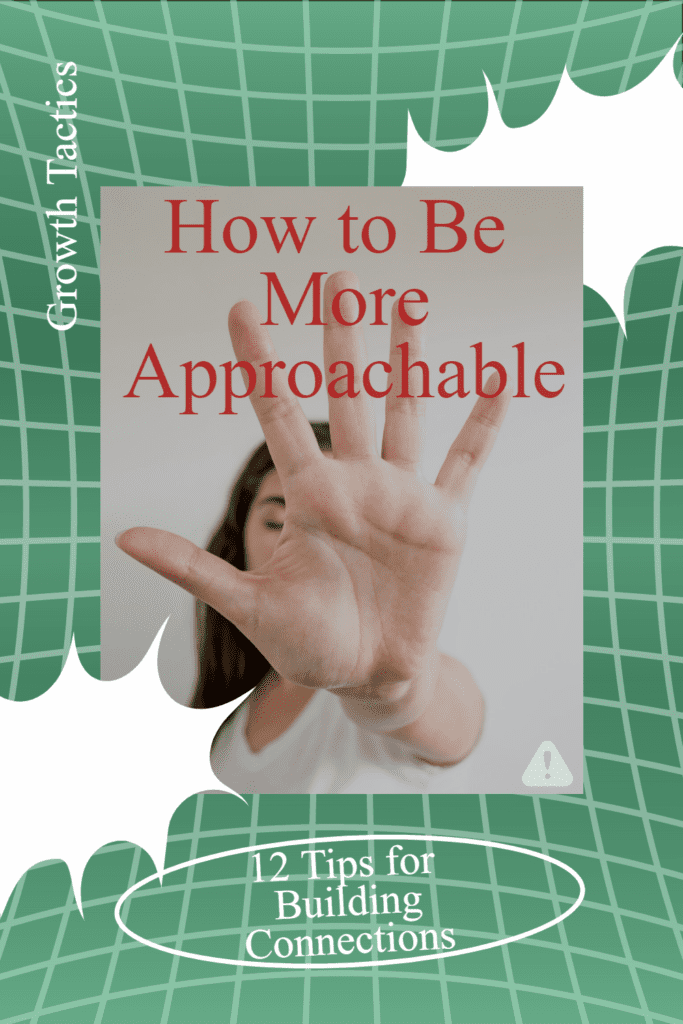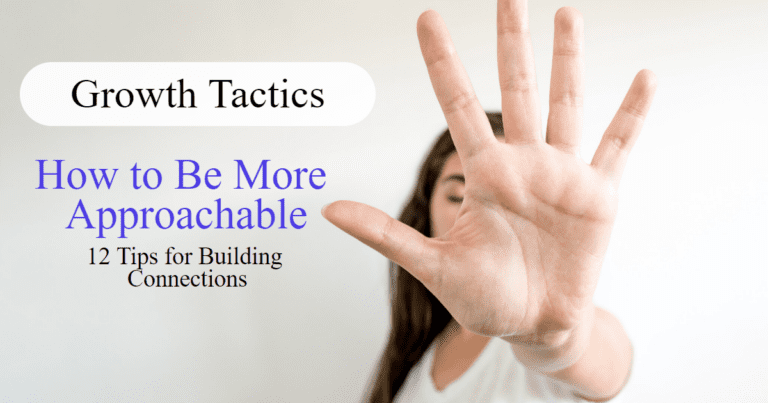Making genuine connections can sometimes feel like a puzzle. Being approachable isn’t just about smiling more, it’s about unlocking doors to new opportunities and stronger relationships.
Whether you’re a leader, a parent, or a friend, making yourself more approachable helps you build the bonds that matter most.
Here, you’ll find 12 practical tips to help you become someone others are eager to connect with. Each tip is designed with you in mind, aiming to bring out your unique strengths while making meaningful connections.
Let’s discover how you can be more approachable, starting now.
Jump To Section
Why Being Approachable Is Important
Building Trust
Being approachable builds trust. When people feel comfortable talking to you, they share more. This creates an open environment where everyone feels valued. Trust is key to strong relationships, both at work and in personal life.
Enhancing Leadership
Approachable leaders inspire their teams. Team members feel safe sharing ideas and concerns. This leads to more collaboration and innovation. An approachable leader is seen as supportive and understanding, motivating others to perform their best.
Personal Growth
Being open to others helps you learn from different viewpoints and experiences. This fosters personal growth. You become more empathetic and understanding.
Better Problem-Solving
When you are approachable, people come to you with their problems. This means you gather more information and insights. Better solutions come from discussing issues before they become big problems.
Creating a Positive Atmosphere
People enjoy being around someone who is friendly and open. It makes interactions smoother and more enjoyable. This positivity can spread, boosting the overall mood and productivity in any setting.
What Makes Someone Seem Unapproachable?
There are a few factors that can make someone seem unapproachable:
- Closed body language: Crossed arms, avoiding eye contact, and tense posture can all signal that you’re not open to conversation.
- Lack of smiling: A simple smile can make a world of difference in how approachable you seem.
- Being constantly busy: If you’re always on your phone or rushing around, people may feel like they can’t approach you.
- Negative attitude: Complaining and negativity can be off-putting, making others hesitant to engage with you.
Characteristics of Approachable People

Here are some characteristics of approachable people that you can work on to become more approachable yourself:
1. Open Body Language
Open body language shows you’re approachable. It builds trust and makes it easy for others to talk to you. This helps you form better connections.
How to build open body language
Eye contact is key. Look someone in the eye when they speak. This shows you care about what they’re saying and builds trust.
Your posture also matters. Keep your shoulders relaxed. Stand or sit up straight. Avoid crossing your arms. These signals show you’re open to talking.
Being mindful of your body language makes you more inviting. People will feel more comfortable approaching you.
2. Friendly Demeanor
A friendly demeanor invites others in. It creates a welcoming atmosphere. People feel more comfortable and valued around you.
How to build a friendly demeanor
Smile often. A genuine smile shows warmth and friendliness. It makes others feel welcome.
Smiling affects your own mood too. It releases feel-good chemicals in your brain. So, when you smile, you’re happier and more approachable.
By smiling more, you create a welcoming atmosphere. This helps you build better connections.
3. Active Listening
Active listening shows you care. It makes the speaker feel heard and respected. This deepens relationships and builds trust.
How to build active listening
Show you’re listening by nodding your head. This small gesture shows you value what the other person says.
Ask follow-up questions. This keeps the conversation going and shows your interest.
By being an active listener, you make others feel heard and appreciated. This strengthens your connections.
4. Empathy
Empathy allows you to connect on a deeper level. It shows you understand and care about others’ feelings. This builds strong, meaningful relationships.
How to build empathy
Approach conversations with compassion. Try to see things from the other person’s perspective.
Validate their feelings. Offer supportive statements or acknowledge their emotions.
You don’t have to agree with them, just show you care. By practicing empathy, you create a safe space for open communication.
5. Positive Attitude
A positive attitude lifts those around you. It makes challenges easier to face. This creates a supportive and uplifting environment.
How to build a positive attitude
Focus on the bright side. A positive outlook can be contagious. It makes others feel at ease.
Practice gratitude. This helps shift your mindset to the positive.
Share uplifting stories or experiences. By fostering a positive environment, you create enjoyable and meaningful connections.
6. Genuine and Authentic
Being genuine builds trust. It shows you’re sincere and honest. People are more likely to connect with the real you.
How to build authenticity
Be true to yourself. Don’t put on a facade.
People sense authenticity. They are more comfortable when they feel you’re sincere.
Embrace your unique qualities. Express your thoughts and feelings honestly. By being genuine, you create an atmosphere of trust and openness.
7. Respectful of Personal Space
Respecting personal space makes others feel safe. It shows you value their comfort. This fosters a respectful and welcoming environment.
How to respect personal space
Be mindful of how close you stand to others. Respect personal boundaries to create a safe and comfortable environment.
Gauge the appropriate space by observing body language. Adjust your distance if the other person seems uncomfortable.
By respecting personal space, you foster an inviting atmosphere.
8. Good Conversationalists
Good conversational skills keep interactions engaging. They help you connect with others. This makes conversations enjoyable and meaningful.
How to build conversational skills
Excel at small talk. Ask open-ended questions to encourage sharing.
Practice active listening. Respond thoughtfully to the conversation.
Discuss light and engaging topics. By being a good conversationalist, you create a welcoming environment for deeper conversations.
9. Non-Judgmental
Being non-judgmental creates an open space. It encourages honest communication. This helps you understand and connect with others better.
How to build a non-judgmental attitude
Be accepting and open-minded. Create an environment where people feel comfortable sharing.
Practice active listening. Don’t interrupt or judge.
Seek to understand different viewpoints. By being open to ideas, you create stronger connections.
10. Relatable
Being relatable makes you easy to talk to. It shows you share common interests or experiences. This builds a sense of connection.
How to build relatability
Find common ground. Look for mutual interests or experiences.
Listen attentively. Share your own experiences that resonate with theirs.
By finding common ground, you create a sense of connection. This makes others feel comfortable and open.
11. Adaptable
Adaptability shows flexibility. It helps you connect with different people in varied situations. This makes interactions smoother and more effective.
How to build adaptability
Adjust your communication style to fit different situations. This shows your willingness to understand and accommodate others.
Observe body language, tone, and cues. Decide whether to be formal or casual, lighthearted or serious.
By being adaptable, you create a welcoming atmosphere and stronger connections.
12. Approachable Online Presence
An approachable online presence extends your reach. It makes you accessible even when you’re not face-to-face. This helps you connect with more people.
How to build an approachable online presence
Make your social media profiles friendly and inviting. This encourages others to connect with you.
Balance your content between personal and professional. Show your genuine interests and personality.
Respond to comments and messages warmly and promptly. By maintaining a friendly online presence, you extend your approachability beyond face-to-face interactions.
By embodying these traits, you create an environment where people feel welcome. This makes it easier to build strong connections in both personal and professional life. Practice these skills with patience, and you’ll see positive results.
Wrapping Up Our Guide on Becoming More Approachable
In conclusion, becoming more approachable is a rewarding journey that can lead to deeper connections and more fulfilling relationships.
By honing your communication skills, finding common ground, adapting to different situations, and maintaining a friendly online presence, you’ll create a welcoming atmosphere that encourages others to engage with you.
Remember, the key to approachability lies in being open-minded, accepting, and genuinely interested in the people around you. Embrace these qualities and watch as your relationships thrive, and your world becomes richer with meaningful connections. So, step out with confidence and embrace the power of approachability!
Did you enjoy this article on how to be more approachable? Please share and subscribe for more Growth Tactics.


